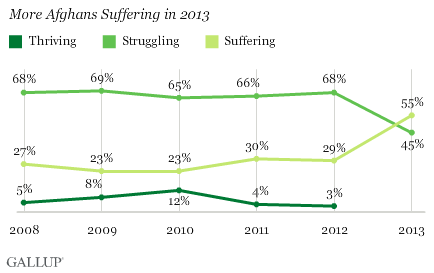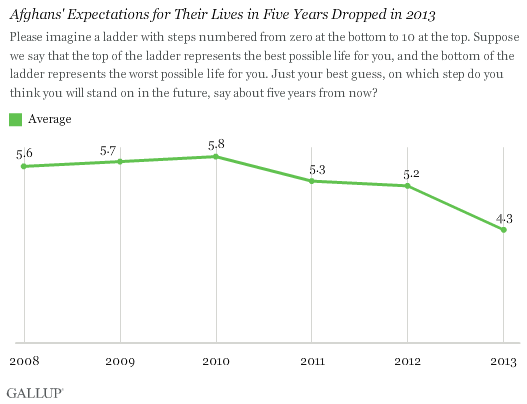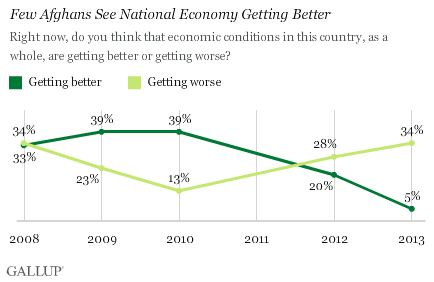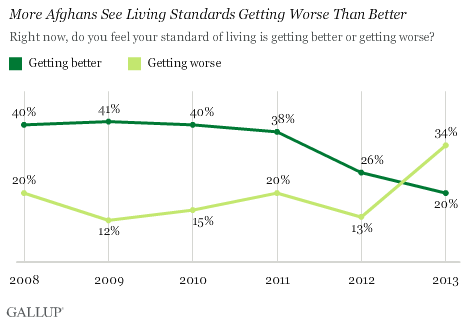WASHINGTON, D.C. -- As Afghans prepare to elect a new president and international forces start to withdraw, their hopes for the future are as grim as ever. The majority of Afghans (55%) rate their lives poorly enough to be considered "suffering," the highest percentage Gallup has measured in the world in 2013.

Gallup classifies people as "thriving," "struggling," or "suffering" according to how they rate their current and future lives on a ladder scale with steps numbered from zero to 10 based on the Cantril Self-Anchoring Striving Scale. Gallup considers people to be suffering if they rate their current lives a 4 or lower and their lives in five years a 4 or lower. The respondents do not label themselves as suffering.
While the majority of the Afghan population is suffering, which is disconcerting on its own, no Afghans rated their lives highly enough to be considered "thriving" in 2013. This is largely because their expectations for their lives in five years dropped to their lowest average since 2008, standing at 4.3 in 2013.

Afghans' Economic Outlook Increasingly Grim
While Afghans express concerns about security issues and terrorism, some of their increasing pessimism about their lives appears to have economic roots. Only 5% of Afghans say their national economy is getting better, with 34% saying it is getting worse.

This souring outlook for the economy is likely an expected reaction as the U.S.-Afghan Bilateral Security Agreement continues to stall. As long as this is the case, the Afghan economy is awash in uncertainty regarding the future security situation and the relative stability for the country as a whole. Failure to clinch an agreement could jeopardize nearly $10 billion a year in economic and military assistance through 2017.
Afghans' assessments of their personal economic situations are just as grim. More Afghans said their standard of living was getting worse (34%) in 2013 than in any other year since 2008. Additionally, 61% of Afghans also said that now is a bad time to find a job in their local job market, a rate not seen since 2008.

Bottom Line
With elections at the doorstep in early April, the Gallup data suggest that those jockeying for the lead at the ballot box will have a tough assignment in improving the lives of their people. Afghans' 2013 life evaluations are as grim as Gallup has measured in any country.
For complete data sets or custom research from the more than 150 countries Gallup continually surveys, please contact us.
Survey Methods
Results are based on face-to-face interviews with approximately 1,000 adults, aged 15 and older, conducted in 2008-2013 in Afghanistan. For results based on the total sample of national adults, one can say with 95% confidence that the maximum margin of sampling error is ± 3.8 percentage points. The margin of error reflects the influence of data weighting. In addition to sampling error, question wording and practical difficulties in conducting surveys can introduce error or bias into the findings of public opinion polls.
For more complete methodology and specific survey dates, please review Gallup's Country Data Set details.
